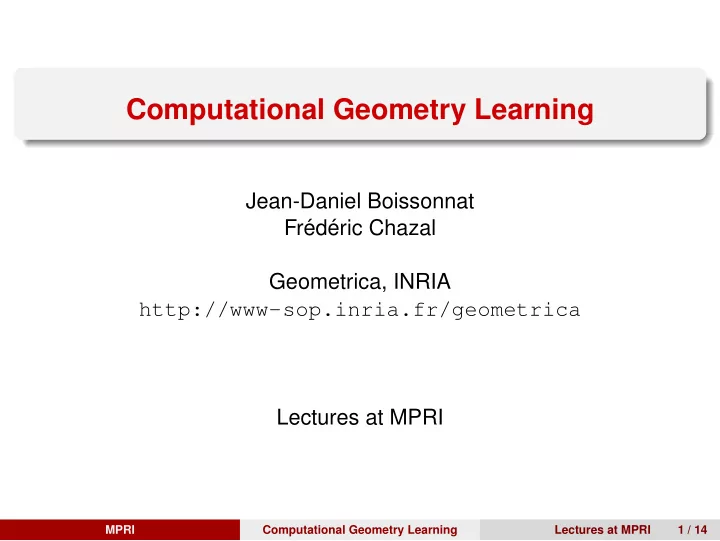

Computational Geometry Learning Jean-Daniel Boissonnat Fr´ ed´ eric Chazal Geometrica, INRIA http://www-sop.inria.fr/geometrica Lectures at MPRI MPRI Computational Geometry Learning Lectures at MPRI 1 / 14
Computational Geometry Learning Jean-Daniel Boissonnat Fr´ ed´ eric Chazal Geometrica, INRIA http://www-sop.inria.fr/geometrica Lectures at MPRI MPRI Computational Geometry Learning Lectures at MPRI 2 / 14
Reconstructing surfaces from point clouds One can reconstruct a surface from 10 6 points within 1mn [CGAL] MPRI Computational Geometry Learning Lectures at MPRI 3 / 14
CGAL-mesh GeometryFactory, Acute3D MPRI Computational Geometry Learning Lectures at MPRI 4 / 14
Geometric data analysis Images, text, speech, neural signals, GPS traces,... Geometrisation : Data = points + distances between points Hypothesis : Data lie close to a structure of “small” intrinsic dimension Problem : Infer the structure from the data MPRI Computational Geometry Learning Lectures at MPRI 5 / 14
Image manifolds An image with 10 million pixels → a point in a space of 10 million dimensions! camera : 3 dof light : 2 dof The image-points lie close to a structure of intrinsic dimension 5 embedded in this huge ambient space MPRI Computational Geometry Learning Lectures at MPRI 6 / 14
Motion capture Typically N = 100 , D = 100 3 , d ≤ 15 MPRI Computational Geometry Learning Lectures at MPRI 7 / 14
Dimensionality reduction MPRI Computational Geometry Learning Lectures at MPRI 8 / 14
Conformation spaces of molecules e.g. C 8 H 16 Each conformation is represented as a point in R 72 ( R 24 when neglecting the H atoms) The intrinsic dimension of the conformation space is 2 The geometry of C 8 H 16 is highly nonlinear MPRI Computational Geometry Learning Lectures at MPRI 9 / 14 � � � � � � � �
Issues in high-dimensional geometry Dimensionality severely restricts our intuition and ability to visualize data ⇒ need for automated and provably correct methods methods Complexity of data structures and algorithms rapidly grow as the dimensionality increases ⇒ no subdivision of the ambient space is affordable ⇒ data structures and algorithms should be sensitive to the intrinsic dimension (usually unknown) of the data Inherent defects : sparsity, noise, outliers MPRI Computational Geometry Learning Lectures at MPRI 10 / 14
Course overview : some keywords Computational geometry and topology Triangulations, simplicial complexes Algorithms in high dimensions Shape reconstruction Geometric inference Topological data analysis MPRI Computational Geometry Learning Lectures at MPRI 11 / 14
Algorithmic geometry of triangulations [JDB] 1 Simplicial complexes in metric spaces (26/09) 2 Delaunay-type complexes (03/10) 3 Weighted Delaunay and alpha complexes (10/10) 4 Thickness and relaxation (17/10) 5 Reconstruction of submanifolds (24/10) Geometric inference [FC] 6 Distance functions, sampling, stability of critical points (31/10) 7 Noise and outliers, distance to a measure (07/11) 8 Computational homology (14/11) 9 Topological persistence (21/11) 10 Multi-scale inference and applications (28/11) MPRI Computational Geometry Learning Lectures at MPRI 12 / 14
Further reading Theses at Geometrica Persistent Homology : Steve Oudot (HDR, 26/11) Distance to a measure : Q. M´ erigot (HDR, 17/11) Triangulation of manifolds : A. Ghosh (2012) Data structures for computational topology : C. Maria (2014) Course Notes www-sop.inria.fr/geometrica/courses/supports/CGL-poly.pdf Colloquium J. Morgenstern www-sop.inria.fr/colloquium Vin de Silva : Point-clouds, sensor networks, and persistence: algebraic topology in the 21st century 26/3/2009 MPRI Computational Geometry Learning Lectures at MPRI 13 / 14
Projects European project Computational Geometric Learning (CGL) cgl.uni-jena.de/Home/WebHome ANR TopData Geometry meets statistics ERC Sdvanced Grant GUDHI Geometry Understanding in Higher Dimensions On the industrial side Californian Startup : www.ayasdi.com MPRI Computational Geometry Learning Lectures at MPRI 14 / 14
Recommend
More recommend